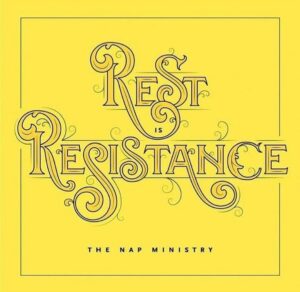
By Sheila Ferguson
Tricia Hersey is the New York Times best-selling author of “Rest is Resistance: A Manifesto.” The Atlanta, Georgia-based theologian, artist, poet, life coach, and community organizer is the self-anointed “Nap Bishop.” Since 2016, she has shared a compelling message about the power of rest to break the cycle of oppression.

The book reads, “Your body is a site of liberation. It doesn’t belong to capitalism, Love your body; Move your body and Hold your body.”
“Nap Bishop” followers believe that taking a break from burnout is lifesaving. They see rest as a pathway to revitalizing your life. Hersey’s book, “Rest Is Resistance: A Manifesto,” published by Little Brown Spark (2022), focuses on two points: giving yourself permission “to live the ‘soft life’ through rest and restoration, and “quiet quitting” the corporate grind and releasing academic pressures that cause fatigue and social and emotional oppression.
Hersey’s views come from her years of struggle as a graduate student at the Candler School of Theology at Emory University. Those were tough years, she recalls. As a grad student of humble means, Hersey was crushed by financial burdens, daily travel on public transit, and the grind of studying tirelessly with little to no sleep. She also cared for an ill family member. All of these pressures were compounded by the COVID-19 pandemic and the horrors of racism in America.
Out of the struggle, exhaustion led Hersey to take daily naps, to daydream, and to have periods of rest and respite. Experiencing this burnout, and the refreshment gained from these simple lifestyle changes, gave birth to Hersey’s Nap Bishop ministry.
The author’s core message is that Black people’s exhaustion stems from a legacy of enslavement, Jim Crow segregation, and modern-day racism. More importantly, Hersey says the recovery of Black people depends on the remembrance of the following:
- Watching our elders rest by reading scripture, meditating, and resting their eyes or feet daily to rejuvenate and renew
- Knowing that allowing rest, sleep, naps, and daydreaming slows us down enough to awaken to the beauty in ourselves
- Releasing ourselves from the grind to resist the capitalist and white supremacist mind
Hersey also stresses that rest is necessary and natural for all of us. Without rest, she says, “we won’t make it! Thus, collective rest will liberate us and shift our consciousness.” Hersey gives the message of rest as resistance with the intent of undoing the harm of exhaustion done to Black bodies. In her words, it starts by moving away from society’s demand for perfection and beliefs.
Today, you can read Hersey’s message in book form, watch and listen online, or attend her live sessions. During live sessions, the author preaches and leads meditation while the participants experience a state of collective rest. Hersey works to jar people enough to wake up through sleep.
Rather than using free time to do extra work, Hersey’s movement inspires people to sleep and rest to stave off burnout, exhaustion, and the risks of premature death. It is also a tool for helping others recognize their full potential beyond fulfilling the role of a slave to society’s demands for mass production and speed in delivering work products.
The How-Tos of Self-Liberation From Obtaining Rest
Though daily sleep and rest are the starting points of Hersey’s theory, healing and self-liberation are its endpoints. She says getting there requires that you:
- Stop worrying and reflect on your needs for peace and comfort. It’s about collectively refusing to run ourselves into the ground.
- Rest and reset for good health.
- Use rest as a form of resistance against oppression because it is life-saving and liberatory.
- Start a daily practice of daydreaming.
- Know that change takes time.
- Slow down, connect, and reimagine your life.
- Know that you are enough.
- Know that exhaustion is not productive.
- Listen to yourself and others more.
- Create systems of community care and support.
Daily Resting Practices
Finally, begin and continue a practice of valuing self and the grace of loving yourself by:
- Closing your eyes once or twice daily,
- Taking long showers in silence,
- Meditating on the couch for 20 minutes,
- Daydreaming by staring out the window,
- Sipping warm tea before bed in the dark,
- Slow dancing with yourself to slow music,
- Taking a twenty-minute timed nap,
- Praying daily,
- Taking regular breaks from social media, and
- Committing to deep listening and enjoying musical albums.
To learn more about Tricia Hersey’s work as the Nap Bishop, search these titles on YouTube:
Tricia Hersey: Rest & Collective Care as Tools for Liberation
Tricia Hersey: Creating a Guided Meditation for “Promise, Witness, Remembrance”
NO MORE GRIND: HOW TO FINALLY REST WITH TRICIA HERSEY – WCDHT EP 139



